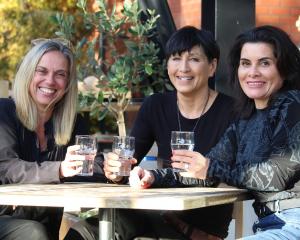Each day, the official death toll from the Christchurch earthquake climbs. Each day, there is news of further heartbreak and trauma. Each day, additional ramifications become apparent from the jolt that shook a city and its people and, as the reverberations spread, a nation to the core.
Each day, the realisation of the enormity of the earthquake sinks in deeper. Christchurch has changed irrevocably, and so has New Zealand.
The country stopped yesterday at 12.51pm, exactly one week on, to gather, to pay respects and to mourn. That is a small something that we could all do, in sadness and in solidarity.
In Dunedin and Otago, the ties to Christchurch are especially close. In the face of the tragedy, rivalries and jealousies count not at all. Red and black, for now, are the new blue and gold.
Christchurch and Canterbury are family. Stunned, bewildered, confused - these have been the dominant states of mind in the first week after the quake.
Rescue workers have searched, utilities workers laboured, welfare workers served and Christchurch residents fled in their tens of thousands. Downtown Christchurch, strewn with rubble and patrolled by the army, resembles a war zone - minus the gun fire.
Silted, stinking suburban streets, and bent, battered and shattered homes are scattered across the eastern and hill suburbs. Remarkably, much of the west of the city is relatively unscathed.
Prime Minister John Key has announced an inquiry that will consider safety issues pertaining to the collapsed buildings that cost so many lives. From this, he said, we will learn the earthquake's lessons.
"Some things are beyond our control but we owe it to people to give them answers."
The next stage, looking to the future, is just beginning. Discussion has started about the shape, style and safety of a new central business district. The process of recovery must be determined and sustained. There will be great difficulties ahead.
There will be differences of opinion on what to do and how to do it. There will be mistakes and there will be impatience. For a start, it has been estimated that more than 100,000 homes need repairs and 10,000 require rebuilding.
That is the equivalent of nearly three times as many houses as exist in Dunedin. It will take a long time, no matter how great and sustained the effort.
There are many questions and decisions, and much uncertainty, to be faced across the rest of the country.
How will New Zealand cope economically with this blow? What damage has been done to the nation's reputation as a tourism destination? How safe are stone, brick and masonry buildings anywhere? How secure are the historic structures so much a part of the essence of Dunedin and Oamaru? In the coming weeks, months and years the knock-on effects will emerge.
But out of the city's ruins will come opportunities, just as they did for Napier (1931) and Kobe (1995).
First, however, a pause is advisable. Only time and distance can provide the perspective necessary to make wise planning decisions and avoid unsound long-term commitments.
In this, community involvement will be important. Residents should have a say in the future shape of their city. And it makes sense to draw lessons from the aftermath of devastation in other cities.
Mr Key and Christchurch Mayor Bob Parker have been leading effectively during the acute phase of the crisis. Now come fresh and different challenges: balancing needs, opinions and realities will demand wise and purposeful leadership.
The connections within our tiny nation - almost every New Zealander has links to Christchurch - mean comprehensive day-to-day emotional, practical, psychological and spiritual help has been offered and accepted informally and unofficially, as well as through official channels.
The population of our region alone has swollen temporarily by many thousands, and telephone, email and social networking traffic to and from Christchurch has been extraordinary. Alongside this has come the essential work of dozens of agencies and organisations, of Government and local government, as well as much help from overseas.
A catastrophe of this magnitude, with only the occasional exception, brings out wonderful human qualities of care and compassion.
Dunedin hearts go out to the people of Christchurch. Everyone wants to help in whatever way they can. At the same time, we all hope and pray that out of despair and anxiety can come hope, purpose and even defiance at what nature has wrought.
From the rubble and the silt, Christchurch can - and will - rise up.






